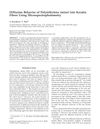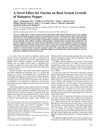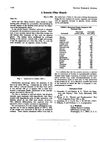 4 citations,
October 2014 in “Springer eBooks”
4 citations,
October 2014 in “Springer eBooks” Ethylene and auxin hormones interact in complex ways that are essential for plant growth and development.
 March 2024 in “Plant physiology”
March 2024 in “Plant physiology” GLABRA 2 controls ethylene production to help root hair growth during nutrient deficiency.
 September 2020 in “Research Square (Research Square)”
September 2020 in “Research Square (Research Square)” Multi-walled carbon nanotubes can enhance plant root hair growth by affecting nitric oxide and ethylene production.
 May 2017 in “bioRxiv (Cold Spring Harbor Laboratory)”
May 2017 in “bioRxiv (Cold Spring Harbor Laboratory)” The peach gene pCTG134 helps control the interaction between auxin and ethylene hormones during fruit ripening.
 December 2022 in “Ankara Üniversitesi Veteriner Fakültesi dergisi”
December 2022 in “Ankara Üniversitesi Veteriner Fakültesi dergisi” Two calves died from ethylene glycol poisoning, a condition more common in pets.
 80 citations,
June 2008 in “Biomaterials”
80 citations,
June 2008 in “Biomaterials” EVAL membranes help create cell structures that can regrow hair follicles.
6 citations,
October 2003 in “Journal of applied polymer science” A new method using poly(ethylene imine) improves hair dyeing at lower temperatures with better color retention.
 5 citations,
April 2005 in “Journal of applied polymer science”
5 citations,
April 2005 in “Journal of applied polymer science” PEI diffuses into hair at a constant rate, and urea speeds up this process.
 356 citations,
March 2012 in “Trends in Plant Science”
356 citations,
March 2012 in “Trends in Plant Science” Auxin and ethylene hormones both work together and against each other to control plant growth.
9 citations,
October 2017 in “Frontiers in plant science” The peach gene CTG134 helps control the interaction between auxin and ethylene, which could lead to new agricultural chemicals.
 24 citations,
March 2022 in “Frontiers in plant science”
24 citations,
March 2022 in “Frontiers in plant science” Plant root hair growth is mainly controlled by hormones like auxin and ethylene, which promote growth, while others like brassinosteroid inhibit it.
 169 citations,
September 2010 in “Molecular & cellular proteomics”
169 citations,
September 2010 in “Molecular & cellular proteomics” Pectin biosynthesis is essential for the growth of cotton fibers and Arabidopsis root hairs.
24 citations,
May 2017 in “Annals of botany” Pathogenic Pseudomonas syringae bacteria stimulate early root hair growth in Arabidopsis plants.
 22 citations,
August 2006 in “Critical Reviews in Plant Sciences”
22 citations,
August 2006 in “Critical Reviews in Plant Sciences” The tropical legume Sesbania rostrata can form nodules in waterlogged conditions using a different method that involves plant hormones and specific genes.
 16 citations,
January 2011 in “Indian Journal of Dermatology, Venereology and Leprology”
16 citations,
January 2011 in “Indian Journal of Dermatology, Venereology and Leprology” Indian dermatosurgical practitioners were given guidelines in 2011 to reduce infection risks, including hand hygiene, sterilization methods, operation theater standards, and proper waste disposal.
 14 citations,
November 2013 in “Journal of the American Society for Horticultural Science”
14 citations,
November 2013 in “Journal of the American Society for Horticultural Science” Glycine slows main root growth but boosts root hair growth in habanero peppers.
13 citations,
December 1983 in “Canadian journal of zoology” Heterotypic cell contacts likely help hair matrix cells differentiate during mouse hair follicle development.
 6 citations,
January 2018 in “Journal of Cutaneous and Aesthetic Surgery”
6 citations,
January 2018 in “Journal of Cutaneous and Aesthetic Surgery” ACD-A gives the highest platelet count for hair rejuvenation, but Sodium Citrate results in less contamination, making it higher quality.
 4 citations,
November 1968 in “Textile research journal”
4 citations,
November 1968 in “Textile research journal” Hair fibers may have a unique, non-protein sheath not previously identified.
 2 citations,
May 2021 in “bioRxiv (Cold Spring Harbor Laboratory)”
2 citations,
May 2021 in “bioRxiv (Cold Spring Harbor Laboratory)” A special foam called EG7 PTK-UR helps heal skin wounds better than other similar materials, working as well as a top-rated product and better than a polyester foam.
 1 citations,
January 2024 in “Scientific reports (Nature Publishing Group)”
1 citations,
January 2024 in “Scientific reports (Nature Publishing Group)” Human hair was used to make biodegradable plastic films that could be useful for packaging and disposable products.
 October 2024 in “Bangladesh Journal of Botany”
October 2024 in “Bangladesh Journal of Botany” Figleaf gourd is more resistant to cinnamic acid stress than cucumber.
 September 2023 in “Plant journal”
September 2023 in “Plant journal” A protein called GIS3 is important for the growth of root hairs in Arabidopsis by controlling two genes with the help of certain growth signals.
 October 2001 in “WORLD SCIENTIFIC eBooks”
October 2001 in “WORLD SCIENTIFIC eBooks” Many substances, including chemicals and metals, can cause skin reactions; careful handling and identification of allergens are crucial to prevent dermatitis.
 355 citations,
August 2013 in “Acta Biomaterialia”
355 citations,
August 2013 in “Acta Biomaterialia” The nanofibers with two growth factors improved wound healing by supporting structure, preventing infection, and aiding tissue growth.
 26 citations,
March 2013 in “Journal of Biomedical Materials Research Part A”
26 citations,
March 2013 in “Journal of Biomedical Materials Research Part A” Researchers created a 3D hydrogel that mimics human hair follicles, which may help with hair loss treatments.
 25 citations,
April 2012 in “Acta Biomaterialia”
25 citations,
April 2012 in “Acta Biomaterialia” Using certain small proteins with a growth factor and specific materials can increase the creation of neurons from stem cells.
 13 citations,
January 2019 in “Colloids and Surfaces B: Biointerfaces”
13 citations,
January 2019 in “Colloids and Surfaces B: Biointerfaces” The new drug delivery systems made with surfactants and block polymers are stable and not toxic.
 12 citations,
January 2018 in “Biomaterials Science”
12 citations,
January 2018 in “Biomaterials Science” Softer hydrogel surfaces help maintain hair growth-related functions in skin cells.
 16 citations,
January 2023 in “Acta Biomaterialia”
16 citations,
January 2023 in “Acta Biomaterialia” The hydrogel quickly stops bleeding and helps heal infected wounds.


























